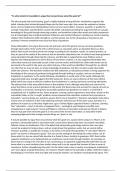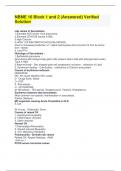“To what extent is it possible to argue that we just know what the good is?”
The idea of good and truly knowing ‘good’ is highly debated among ethicists. Intuitionism supports this
belief, claiming that intrinsically good things exist for their own sake, they cannot be analysed or broken
down, and we simply know that goodness exists, but we cannot define, measure, quantify, or qualify the
concept. Naturalism and Emotivism counter this belief, naturalism providing the argument that we can gain
knowledge of the good through observing creation, and emotivism claims that morals and value statements
are all meaningless due to logical positivism influences and societal influences clouding our moral reasoning.
I believe that intuitionism holds strength to a certain extent, due to the strong idea of conscience and
evolution, however emotivism may cloud our ideas of goodness
Many philosophers may argue that we do not just know what the good is, but we can know goodness
through observation of the world. This is often known as naturalism and is an absolutist theory as they
believe that morals are fixed and do not change according to the situation, results, or cultural practice, as
they are part of the reality of the universe and are therefore objectively true. An ethicist may know goodness
using naturalism through observing the universe, and this idea is supported by many thinkers such as
Aquinas who linked goodness to God’s divine will and God’s creation, it is also supported by Bradley who
claims that morals are observable as part of the concrete world, and finally Foot claims that morals can be
perceived in the world in the same way other features of the world are identified. Through this, an ethicist
can infer that we may not have an innate knowledge of goodness, but this concept is easily observable
within the universe. This therefore weakens the title statement as naturalism provides a strong argument for
knowledge of the concept of goodness being gained through looking at creation, and we can observe a
breakdown in ‘goodness’ in the world following a breakdown in social order of the world. Although this
argument holds clear strength against the title statement, there are many criticisms of this meta-ethical
belief which may cause an ethicist to believe that intuitionism is a strong and more convincing alternative.
The obvious flaw in this meta ethical theory is the problem of evil; although naturalists use moral evil to
prove that there can be a lack of goodness in the world, this theory does not account for natural evil such as
earthquakes or tsunamis, leaving many to possibly question how goodness can exist in a world full of
unexplained evil. In addition to this, Hume proposes a strong counter argument to naturalism, known as the
naturalistic fallacy or the ‘is-ought’ problem, Hume proposes that naturalism confuses facts and value as
naturalists “say how things are, and then assume that’s how it should be”, therefore naturalistic meta ethics
may be seen as reductive as this is like believing someone will shoot you if they have a gun, but there is a
plethora of reasons as to why they might have a gun. Charles Pigden supported Hume’s criticisms, claiming
that “naturalists… resort to all sorts of supposed facts – sociological, psychological, scientific even
metaphysical or supernatural”. Hume and Pidgen’s criticisms of naturalism may lead an ethicist to believe
that we may just know what the good is as we cannot infer it from observation, as naturalism makes
sweeping judgements that wrongly assume things are ‘good’ or not.
It may be possible to argue that we just know what the good is to a great extent using G. E. Moore as he
provides a strong alternative to naturalism with a meta ethical theory that does not commit naturalistic
fallacies, known as intuitionism. This is the belief that intrinsically good things exist for their own sake,
cannot be analysed or broken down, and we simply know that goodness exists, but we cannot define,
measure, quantify, or qualify the concept, as he claims in his book Principa Ethica “If I am asked ‘What is
good?’ my answer is that good is good.” One can use the analogy of describing the colour yellow, we all
know what it is, but we cannot fully describe it or break it down, similarly to goodness. W.D. Ross further
supports intuitionism as he believed that we could know moral truths through intuition, for example we
know that it is wrong to lie. This idea is very convincing as an argument supporting the belief that we just
know what is as most societies share similar values and it can be argued that humans all have a sense of
conscience, further strengthening the point. On the other hand, views in society may disagree, intuitionists
can’t even agree amongst themselves, for instance: Moore holds to the principle of utility, while Ross takes a
deontological. If we knew what was right and wrong by intuition, our intuitions would generally agree. This





